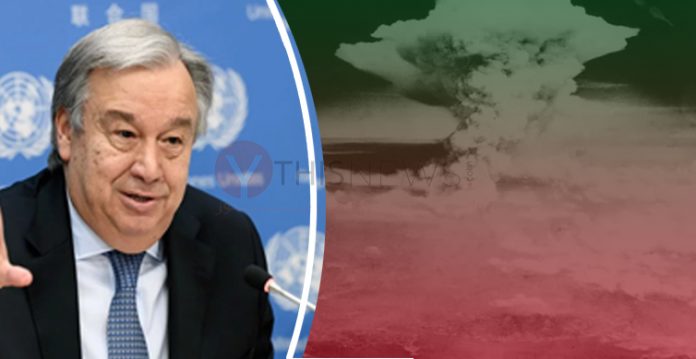In a major development for the activists of the TPNW (Treaty on Prohibition of Nuclear Weapons) and the banning of nuclear weapons in general, the UN announced that it has received the 50th ratification needed to bring the treaty into force.
The treaty requires the countries ratified not to possess, use, or manufacture any nuclear weapon.
The historic moment was brought in after Honduras landed as the 50th country to ratify and mark the change. The UN declared on Saturday that the treaty will be put into action within 90 days.
Nuclear power holders like the US, China, Russia, France, Britain, and others have always stood against the treaty. The administration of Donald Trump has, in fact, written to the ratified states to withdraw their support from the treaty.
However, the UN Secretary-General Antonio Guterres applauded all the 50 countries for playing a vital role in maintaining the civility of the society, according to his spokesperson StephaneDujarric’s speech on Saturday.
22nd January 2021 will be celebrated as the day of bringing the treaty into force, said the UN chief, adding that this is being done “to draw attention to the catastrophic humanitarian consequences of any use of nuclear weapons” while also calling the treaty a “tribute to the survivors of nuclear explosions and tests, many of whom advocated for this treaty”.
Mr. Dujarric, while speaking on behalf of Guterres, said the treaty “represents a meaningful commitment towards the total elimination of nuclear weapons, which remains the highest disarmament priority of the United Nations”.
This move of the UN has been commended by many pivotal parties around the world, including the International Campaign to Abolish Nuclear Weapons (ICAN), the 2017 Nobel Peace Prize-winning association, who called the event as “UN at its best”.
Beatrice Fihn, the executive director of ICAN said, “This moment has been 75 years coming since the horrific attacks on Hiroshima and Nagasaki, and the founding of the UN which made nuclear disarmament a cornerstone.”
“The 50 countries that ratify this Treaty are showing true leadership in setting a new international norm that nuclear weapons are not just immoral but illegal,” she added.
Coincidentally, Honduras’s ratification arrived on the 75th anniversary of the UN.
UN had been established on the 24th of October, 1945, and every year the day has been celebrated as the official date of its formation.
Ms. Fihn said the UN had been founded with a motto of promoting peace along with the aim of wiping the global use of nuclear weapons and the TPNW is a reflection of the work it has done to “bring democracy to disarmament”.
The treaty’s major clause needs the countries ratified to “never under any circumstances … develop, test, produce, manufacture, otherwise acquire, possess or stockpile nuclear weapons or other nuclear explosive devices”. “It also bans any transfer or use of nuclear weapons or nuclear explosive devices – as well as threatening to use such weapons – and requires parties to promote the treaty to other countries.”
With the advent of this treaty and its act of bringing into force in January, the ratified countries will have to abide by all the clauses.
Yet, supporters and campaigners who stand for banning the use of nuclear weapons believe the non-nuclear treaty-bound countries too will affect them, producing a change in their actions as did the earlier international treaties of landmines and cluster munitions.
On the other hand, the letter sent by Donald Trump’s administration to the ratified countries says they all made a “strategic error” and persuaded them to back out.
The Associated Press news agency quoted the letter after obtaining it from sources that the new treaty was “dangerous” to the existing Nuclear Nonproliferation Treaty that was brought into force in 1970.
The treaty was made to stop countries, other than the five original nuclear power ones, from possessing, obtaining or manufacturing nuclear arms.
Rubbishing the claim, Fihn said, “There’s no way you can undermine the Nonproliferation Treaty by banning nuclear weapons. It’s the end goal of the Nonproliferation Treaty.”
Currently, different parts of the world possess over 14,000 nuclear bombs, the majority of which can be launched in a moment. Many of these hold ten times more the power of those nuclear bombs that eradicated Hiroshima and Nagasaki
One of the survivors of the 1945 attack on Hiroshima, Setsuko Thurlow, said, “When I learned that we reached our 50th ratification, I was not able to stand.”
She has been a devoted campaigner of the treaty since September 20th, 2017 when the treaty was opened for signatures by the UN.
“I remained in my chair and put my head in my hands and I cried tears of joy. I have committed my life to the abolition of nuclear weapons. I have nothing but gratitude for all who have worked for the success of our treaty,” she said.
India, until now, hasn’t signed or ratified to the TPNW and isn’t a part of the big five nuclear powers as well as it launched its first nuclear weapon in 1974, after the NPT was brought into existence.


